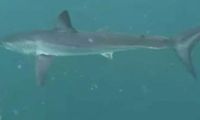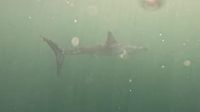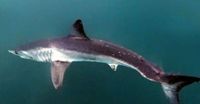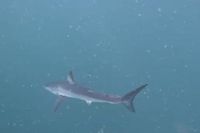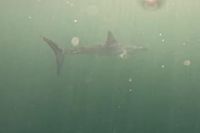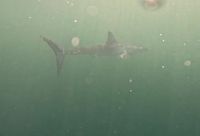A rare mako shark was filmed swimming in the waters between Ipanema Beach and the Cagarras Islands in Rio de Janeiro on Sunday, March 23, 2025. This sighting marks the first time this species has been observed in the urban waters of the city, generating excitement in the marine biology community and among wildlife enthusiasts.
The mako shark (Isurus oxyrinchus), known for its incredible speed of up to 70 km/h, is a vital predator in maintaining the balance of ocean ecosystems. Its agility and hunting prowess make it a key species in the marine food chain, helping to keep the ecosystem healthy. Despite its reputation as a formidable predator, encounters between sharks and humans are exceedingly rare. The risk of attacks is low, and interactions with these creatures are generally peaceful when approached respectfully.
However, a much graver threat looms over this species: its survival. An estimated 80 million sharks are killed each year worldwide, primarily due to predatory fishing and accidental capture. According to the Urban Sea Institute, preserving shark species like the mako is crucial for ensuring the health of our oceans, as these animals play a fundamental role in regulating marine fauna.
The filming of the shark was conducted by diving instructor Andrew Macau, who was leading a group towards the Cagarras Islands. “As we stopped the boat, the shark approached us, and we had the opportunity to dive,” Macau recounted, highlighting the unique experience of interacting with such a rare species in Rio's waters. According to Andrew, the chance to dive with a mako shark is extremely rare, with guided dives costing up to R$ 6,000. “Knowing that this animal is here is a privilege, but it’s crucial to ensure the safety of divers and, above all, the well-being of the shark, avoiding stress,” he added.
The mako shark is classified as an endangered species, and sightings like this one are important for raising awareness about marine conservation. Nathan Lagares, a researcher at the Urban Sea Institute, stated, “It’s a species that poses no danger to humans. On the contrary, it is a very important predator for marine balance. We are very happy with this sighting.”
On Monday, March 24, 2025, the excitement continued as news spread of the shark's appearance. The sighting occurred during a diving expedition by Macau Dive, and experts confirmed that the shark posed no risk to beachgoers. “Rio de Janeiro has a nearly zero history of shark incidents. This sighting is a reason for joy, as it represents an essential predator for the marine ecosystem,” explained Ricardo Gomes, director of the Urban Sea Institute, in a social media post.
In 2024, there were 76 shark attacks reported worldwide, including 17 provoked attacks and 6 fatal incidents, according to data from Shark Attack Map. In the past year, 47 unprovoked attacks were confirmed, a significant drop compared to previous years, and below the ten-year average of 70 attacks. In Rio de Janeiro, only seven fatal attacks have been documented since 1931.
Macau described the moment of encountering the shark: “We were heading towards the Cagarras when we spotted the dorsal and tail fins coming towards us. We stopped the boat, and to our surprise, the shark came right up to us,” the instructor from Macau Dive shared. This rare encounter has sparked interest among researchers and marine enthusiasts alike, reinforcing the importance of conservation efforts in the region.
The mako shark, which can grow up to 4 meters in length, is not only known for its speed but also for its ecological significance. Its diet consists of fast fish such as tunas and squid, helping to maintain the balance of marine populations. Without top predators like the mako, ocean ecosystems can become unbalanced, leading to overpopulation of smaller species and wider impacts on food chains.
Despite the excitement surrounding the recent sighting, the global situation for the mako shark remains concerning. About 80 million sharks are killed annually, many captured accidentally in fishing nets or targeted for their fins. The slow reproductive cycle of the mako complicates recovery efforts, as males reach sexual maturity at eight years, while females take up to eighteen years.
In Brazil, the Cagarras Islands play a crucial role in protecting species like the mako. The area prohibits predatory fishing within a ten-meter radius around the islands, creating a sanctuary for marine fauna. However, the proximity to the coast exposes the ecosystem to threats such as waste disposal and boat traffic, which can affect water quality and the survival of resident species.
Cláudio Sampaio, a biologist, noted that the mako is rarely seen in shallow waters. Its presence near Ipanema may indicate a search for safety or food but also highlights the importance of protected areas like the Cagarras. He emphasized that conserving these habitats is vital to ensure that endangered species continue to thrive, even in urbanized regions.
Historically, shark sightings along the carioca coast are not frequent but not unprecedented. In 1999, a doorman captured a blue shark at Ipanema Beach using only his hands, a case that gained notoriety and illustrated that, while rare, these animals occasionally approach the shoreline. Another notable incident occurred in 2022 when a 2.5-meter hammerhead shark was found trapped in a net near the Cagarras Islands.
Andrew Macau, who recorded the mako, highlighted the minimal risk involved. He compared diving with sharks to a privileged experience, something that, in other countries, can cost up to R$ 6,000. He believes that the presence of the shark in Rio's waters indicates that nature still resists urban pressures, offering a rare spectacle for those who dive or navigate the area.
The Cagarras Islands, located just a few kilometers from Ipanema, are a key point for biodiversity in Rio. This archipelago, comprising six islands and islets, is home to around 220 cataloged species, including fish, birds, and marine mammals. The legal protection of the archipelago, established in 2010, marked a significant milestone for marine conservation in Rio, transforming the area from one plagued by predatory fishing to a haven for marine life.
As the excitement around the mako shark sighting continues, researchers hope it will inspire further studies and preservation actions, especially as the species faces global risks. The mako shark serves as a powerful symbol of marine resilience and a reminder of the urgent need for conservation efforts to protect our oceans.
